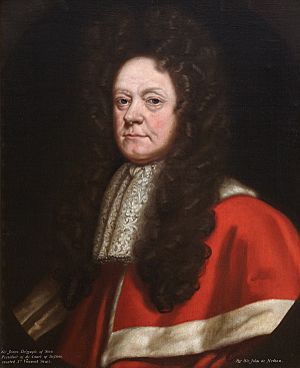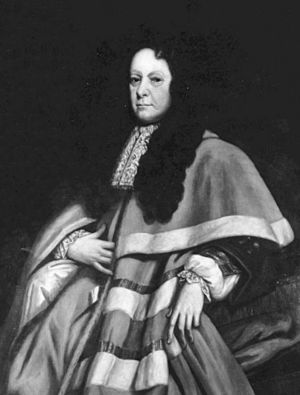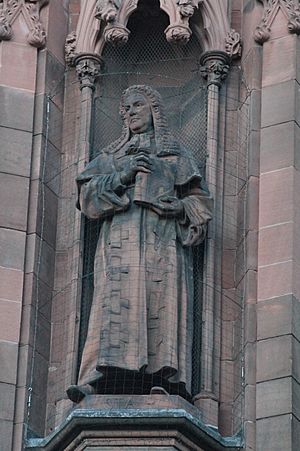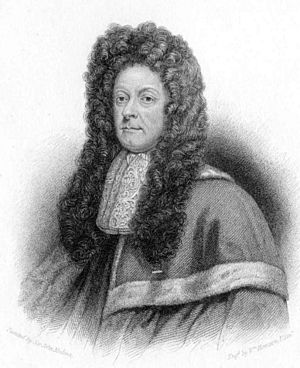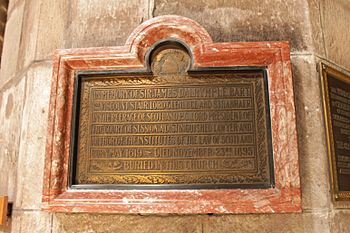James Dalrymple, 1st Viscount of Stair facts for kids
James Dalrymple, 1st Viscount Stair (born May 1619 – died 29 November 1695) was a famous Scottish lawyer and statesman. He had a big impact on the Scottish Enlightenment, a time when new ideas in science, philosophy, and art became popular in Scotland. He was a top figure in Scottish law, and some even say he was "one of the greatest thinkers on law across Europe."
According to Professor Alexander Broadie, the first Scottish Enlightenment started after the Reformation in the 15th century. Important thinkers like John Mair, James Dalrymple, and others were part of this period. Many of these scholars studied at Paris University. They then came back to teach at Scotland’s old universities like St Andrews, Aberdeen, and Glasgow.
James Dalrymple graduated from Glasgow University in 1647. He taught there from 1641 until 1647. The next year, he became a lawyer. Later, he was made a judge. From 1661, Dalrymple, who was by then Viscount Stair, worked in the Court of Session. He was involved in many important events in Scottish history.
His most important work was a book called The Institutions of the Law of Scotland. This book helped set up Scottish law on a strong basis. It also helped make sure that Scots law stayed separate after Scotland and England joined together in 1707.
Contents
James Dalrymple's Life Story
Early Life and Education
James Dalrymple was born at Drummurchie, Barr, Ayrshire. His family had supported the Scottish Reformation for many years. His father, James Dalrymple, died when James was very young. His mother, Janet Kennedy, made sure he got a good education. He went to school in Mauchline. In 1633, he started studying at the University of Glasgow. He finished his arts degree in 1637.
The next year, he went to Edinburgh. He probably planned to study law. But the country was facing problems, so he changed his plans. He joined the Covenanter army in the War of the Covenant.
Becoming a Teacher and Lawyer
We don't know exactly what he did in the war. But he was leading a group of soldiers when he was called back to Glasgow University in 1641. He was chosen to be a "regent," which was like a professor. He taught subjects like Mathematics, logic, ethics, and politics. His colleagues praised his hard work in college matters. His students were also thankful for his teaching.
After almost seven years, he left his teaching job. He moved to Edinburgh and became a lawyer on 17 February 1648. This step was probably made easier because he had married Margaret Ross four years earlier. She owned land in Wigtown.
Working with Kings and Governments
James Dalrymple was not known for being a great speaker in court. His skills were more in learning and business. People trusted him. This was shown when he was made secretary in 1649. He went to the Hague to talk with Charles II for the Scottish Parliament. The talks stopped because the young king didn't want to agree to the Covenanters' terms.
Stair was sent again the next year to Breda. This time, Charles II had to change his mind. He agreed to return to Scotland as the Covenanter king. Stair went ahead of him. He met the king when he landed in Aberdeenshire. He probably brought the news of the execution of Montrose, which he had seen.
During the time of the Commonwealth of England, Stair continued to work as a lawyer. But in 1654, he refused to promise loyalty to the Commonwealth. Three years later, he was appointed a judge in Scotland. This was suggested by Monk. His appointment was confirmed by Oliver Cromwell.
Working with English judges helped him learn about English law. His travels had also taught him about civil law and other European legal systems. This gave him a special advantage when he wrote about law. He looked at it from a worldwide view, not just a local one.
Challenges and Important Laws
His time as a judge was short then. After Cromwell died, the courts in Scotland closed. Stair became close friends with Monk during this time. Soon after Charles II became king again, Stair went to London. Charles liked him. Stair was knighted and became a judge in the Court of Session again in 1661.
He also joined many important groups. He worked on local and farming matters. Like many Scottish judges, he also enjoyed being a good country gentleman. In 1662, he was one of the judges who refused to say that certain oaths were unlawful. He offered to resign. But the king called him to London. He allowed Stair to take the oath with a special understanding.
In 1669, a sad family event happened. His daughter Janet married Dunbar of Baldoon. Something tragic happened on their wedding night. She never fully recovered. There are different stories about what happened. Sir Walter Scott used this event for his book Bride of Lammermoor.
In 1670, Stair was one of the Scottish people who went to London to talk about the Union of Scotland and England. But the plan failed. In 1671, Stair became Lord President of the Court of Session. This was the head judge of Scotland's main court. He also served in parliament and helped create important laws.
During a difficult time in government, Stair tried to help people who were being punished for religious reasons. But mostly, he stayed away from the government council because he didn't agree with their policies.
In 1679, he went to London to defend the court against claims of unfairness. He was thanked for his success. The next year, when the Duke of York came to Scotland, Stair gave a brave speech. He said he was happy the Duke was among a nation that was fully Protestant. The Duke did not like this speech. He became Stair's enemy.
This stopped Stair from becoming Chancellor in 1681. That year, parliament passed two important laws. One was about signing legal documents, which Stair helped write. The other was the Test Act. This law made people take difficult oaths. Stair tried to make it less harmful. But it was still enforced strictly.
Stair feared a similar fate. He went to London to see the king. But the Duke of York stopped him. When Stair returned to Scotland, he found his name was removed from the list of judges.
Exile and Return
He went to his wife's land in Galloway. He worked on his great book, The Institutions of the Law of Scotland. He published it in 1681. But he was not allowed to study in peace. His wife was accused of going to illegal religious meetings. His workers and tenants were fined. He was not safe from being charged himself.
He went to Holland in October 1684. He lived in Leiden with his wife and younger children. While there, he published his court records and a book on natural philosophy. In his absence, he was accused of treason. He was charged with being involved in a rebellion and a plot against the king. He had no connection to the first two charges. He probably supported Argyll's attempt, but the proof was weak.
The charges against him were never fully dealt with. They were delayed until 1687, then dropped. This happened because his son, John, who had made peace with James II, became Lord Advocate. Stair stayed in Holland until 1688. He then returned with William of Orange. William became a strong friend to Stair and his family.
Stair's son became Lord Advocate. In 1690, Stair was again made head of the Court of Session. Some people in the Scottish parliament opposed him. They attacked him in a pamphlet. He defended himself by publishing an Apology, which cleared his name. Soon after, he was made Viscount Stair.
Later Years and Legacy
He was now very successful. But his last few years were sad. In 1692, his wife died. She had been his faithful partner for almost fifty years.
The Massacre of Glencoe (13 February 1692) happened. This event stained his son, John, with a bad reputation. John was a main adviser to William for this cruel act. Stair's own part in it was small. It was said he refused to accept an oath of loyalty from Glencoe's leader. But this was not clearly proven. Still, some of the blame for his son's actions fell on him.
His opponents found other reasons to complain. A person who lost a court case accused him of being unfair. He was also accused of controlling other judges and favoring his sons' clients. Two bills were introduced in parliament that were aimed at him. But after a full investigation, he was found innocent. The bills were dropped.
James Dalrymple died on 29 November 1695, at his home in Edinburgh. He was 76 years old. He was buried in the church of St Giles. His Edinburgh house was later redeveloped in 1843 to build New College.
In 1695, a small book called A Vindication of the Divine Perfections was published. It was edited by two religious leaders who had been in Holland with Stair. This book was certainly his work. It shows his serious thoughts and his true religious character.
James Dalrymple's Important Writings
Stair's main legal book is The Institutions of the Law of Scotland. This book shows how his philosophical training, travels, and knowledge of other legal systems influenced him. The famous Stair Memorial Encyclopaedia, which explains Scottish law today, is named after his work.
His book Physiologia was also well-regarded by the scientist Robert Boyle.
His Talented Family
Stair was lucky to have talented children and grandchildren. Sir Walter Scott once said that the Dalrymple family produced "as many men of talent" as any family in Scotland.
His five sons were all successful in their careers:
- John, Master of Stair (1648–1707) became the 2nd Viscount of Stair. He was later made the 1st Earl of Stair in 1703. He was a skilled lawyer and politician. He is mostly remembered for his part in the Glencoe massacre.
- Sir James Dalrymple, 1st Baronet became a baronet in 1698. He was a chief clerk in the Court of Session. He was also a very careful and accurate historian.
- Sir Hew Dalrymple (1652–1737) took over his father's role as president. He was thought to be one of the best lawyers and speakers of his time. He also became a baronet in 1698.
- Thomas Dalrymple became a doctor to Queen Anne.
- Sir David Dalrymple, 1st Baronet (1665–1721) became a baronet in 1701. He was Lord Advocate under Queen Anne and George I. In 1709, he bought a beautiful house called Whitehill and renamed it Newhailes. It still stands today near Musselburgh. His grandson was the famous judge and historian, Lord Hailes.
Stair's grandson, John (1673–1747), became a field-marshal. He was successful in both war and diplomacy. He was an ambassador in Paris. He also served under Marlborough. He was commander-in-chief of the British forces in 1742. He showed great bravery at the Battle of Dettingen.
Published works
- Theses logicae, metaphysicae, physicae, mathematicae, et ethicae. Glasgow, 1646
- An apology for Sir James Dalrymple of Stair, President of the Session, by himself ... Edinburgh, 1690
- The decisions of the Lords of Council & Session, in the most important cases debate before them, with the Acts of Sederunt. As also, an alphabetical compend of the decisions, with an index of the Acts of Sederunt, and the pursuers and defenders names. From June 1661. to July 1681. ... observed by Sir James Dalrymple of Stair. 2 vols. Edinburgh, 1683
- The institutions of the law of Scotland, deduced from its originals, and collated with the civil, canon and feudal laws; and with the customs of neighbouring nations ... . Edinburgh, 1681
- The institutions of the law of Scotland, deduced from its originals, and collated with the civil, canon and feudal laws, and with the customs of neighbouring nations. 2nd ed. Edinburgh, 1693
- The institutions of the law of Scotland, deduced from its originals, and collated with the civil, and feudal-laws, and with the customs of neighbouring nations. 3rd ed. Edinburgh, 1759
- The institutions of the law of Scotland deduced from its originals and collated with the civil, canon and feudal laws and with the customs of neighbouring nations. New ed. 2 vols. Edinburgh, 1832.
- The institutions of the law of Scotland deduced from its originals, and collated with the civil, canon and feudal laws, and with the customs of neighbouring nations … ; edited by David M. Walker. Edinburgh : University Presses of Edinburgh and Glasgow, 1981. ISBN: 0-85224-397-9
- The laws of Scotland : Stair memorial encyclopaedia. Edinburgh : Butterworths, 1999-
- Physiologia nova experimentalis in qua generales notiones Aristotelis, Epicuri, & Cartesii supplentur errores deteguntur & emendantur …. Lugduni-Batavorum [Leiden], [1686]
 | Roy Wilkins |
 | John Lewis |
 | Linda Carol Brown |


